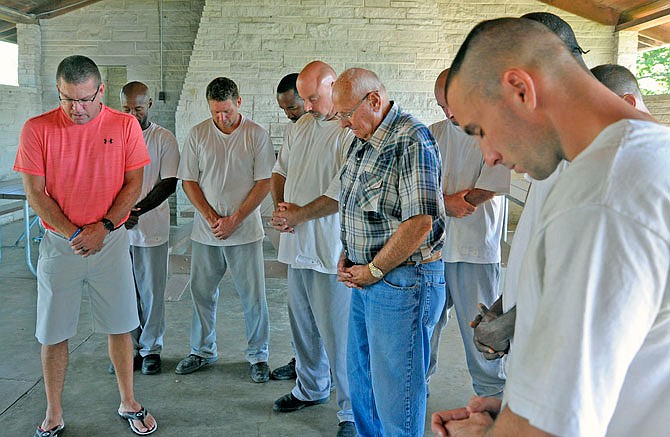Last week, 10 offenders from the Tipton Correctional Center gave up their normal work release program to spend a week with California church members cleaning up the city's parks.
Their regular work release programs pay about $7 per week and have them cleaning up roadways or conservation areas. But this week's participants in the Inside Church Men's Group said the positive atmosphere and encouraging conversations were well worth it.
The United Church of Christ and the United Methodist Church have hosted this week for 17 years. The offenders said they gained self-worth, and it refreshed their dignity by being part of the week.
A few of this year's participants have been part this program before. They agreed there is no other program through the Tipton Correctional Center like this one for its personal attention and positive motivation.
Mike Staton has been the Inside Church Men's Group chairman for the last six years.
The idea came to California churches by way of Boonville churches, which have seen good impacts from the program. In 1999, church leaders like Abe Rohrbach received the Volunteer in Corrections training and hosted their first program.
"We feel like we can't go wrong by showing these fellows there are people who care about them," Rohrbach said. "They've given us a different attitude about prisoners and maybe we've given them a different attitude about us."
The first work project was sheet-rocking and painting the second story of the Moniteau County Historical Society.
The following years, they worked on projects at the Moniteau County Fairgrounds and other small projects around town. When they came up short one year with things for the offenders to work on, the churches reached out to the city parks department.
For more than 13 years, it has been a beneficial partnership. Through the years, offenders have helped improve park property, such as building the restrooms near the Proctor Park gazebo, putting a new roof on the scout house and maintaining trees and mulch.
"They've been a big help to us; we get a lot of stuff done," Park Supervisor Robert Pace said. "It's a good program; we look forward to it."
This year, the 10 offenders helped put a metal roof on the Rohrbach Shelter House, as well as put safety capping on the ball field fencing and other jobs around the parks. Without the offenders' help on the roof project, Pace said they might have had to subcontract the work.
But, "the work that gets done is not the most important part," Rohrbach insisted. Faith, he said, is "what it's all about."
Each morning begins with welcoming faces from the congregations and the community, who greet the offenders for breakfast and fellowship. Groups and individuals have been eager each year to volunteer preparing meals for the men, Staton said.
Then, they move upstairs to the sanctuary for hymns and a devotional, led by a variety of community leaders.
For one offender this year, it was the first time he had ever set foot inside a church.
The offenders appreciate the positive messages they hear each morning, they said, as it is contrast to much of the negatives they experience inside the correctional center.
The week ends with the offenders sitting in the pews of one of the host churches alongside the people they've been working with the past week. They each receive a Bible donated by local organizations and businesses.
But it's the informal times when Staton thinks faith is shared the most - in one-on-one conversations over a soda during a break or in small groups during the donated lunch.
Often offenders simply appreciate someone willing to hear their story, Staton's wife, Robin, said.
"Then you can minister to them in that situation," she said. "Some go deeper than others; I've had some guys in tears."
Some of the offenders agreed the atmosphere of support and caring made them feel valued.
"It's about belonging," Staton said. "Some guys have never felt welcome anywhere. We give them a sense of home, a taste of family."
Staton has never been at a loss for volunteers.
"Everybody loves the opportunity to pour into these guys," Staton said. "It's heartwarming to see so many members of the two congregations. It tells the guys genuine people care about them."
That's the primary goal.
"We want to connect with these guys and give them hope," Staton said. "These guys will re-enter society; we want to help them on the right path to be a good citizen."
Many of the offenders come from a background of poor choices or lack of role models, Staton said. But the message is "none of us can ever get so off course we can't get back on course," he said.
"God created each of us for a unique purpose - not to live a long, miserable life and die," he said.

